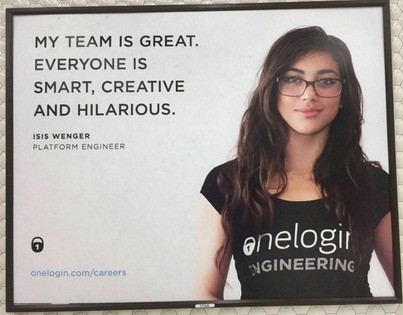An American female engineer who hit back at Internet pundits for their sexist remarks has spawned a social media campaign using the hashtag #LookLikeAnEngineer to decry gender biases and stereotypes.
Isis Wenger, 22, who describes herself as a "self-taught engineer" and "extreme introvert," initially generated flak after her photograph was placed in a recruitment ad. She then wrote a blog expressing her angsts, and encouraged others to share what an engineer should look like, sparking thousands of tweets, The Washington Post reported.
Wenger said that she was blown away by the huge amount of attention created by the OneLogin ad, showing her photograph with the company's creative pitch that her team is great and every member is "smart, creative and hilarious." The ad elicited comments that reflected somewhat sexist attitudes in the male-dominated technical profession.
Wenger's instinctive reaction to the hullaballoo was that she did not ask for the attention. She did make clear that she and her fellow professionals are "all humans" who need not tolerate demeaning behavior patterns in the work environment, her A Medium Corporation site stated.
By voicing out how she is fed up with an industry culture that fosters insensitivity for individuals who do not fit a preconceived mold, Wenger has inspired many people in the engineering and allied professions to speak up and stand proud.
When Wenger urged people to post their photographs with the #ILookLikeAnEngineer, she received an overwhelming response from engineers and tech-industry practitioners of different nationalities and specializations. Before long, scathing remarks, like one that came from a man who tweeted that empowered women ought to show high quality work rather than flash paper with "dumb mantras" were outnumbered by positive comments.
One male artist tweeted that smart women are the most attractive. Even aspiring engineers derived inspiration. A student said she got a confidence boost and now believes she can make it in the tech profession. The hashtag touched a nerve even among male tech professionals who have encountered stereotyping and discrimination at work.
The occurrence highlighted the power of virtual technologies, and validation as a huge force driving online users.



























